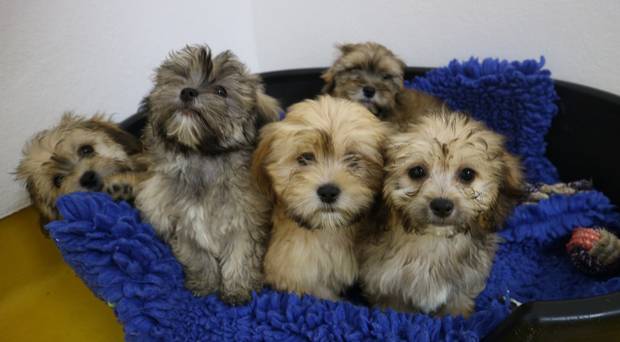We can all fall for the “Aww Cute” factor when we see gorgeous pics of kittens, puppies, dogs and cats online. Most are just adoring pet parents sharing pics of their beloved fur friends – but it’s important to watch out when you see pets being advertised online in particular on sites such as Facebook, Trading Post and Gumtree.
Buying pets online can be bad news for dogs and people the pet, as they could come from a puppy farm, or a “backyard breeder” who figures it would be a quick and easy way to make some money.
What is a Puppy Farm or Puppy Mill?
Puppy Mills are large scale commercial breeding facilities, with one objective. MONEY. Dogs in Puppy Mills may spend their whole life in a cage, and can be bred over and over again. Once they stop breeding, they are conveniently discarded.
Puppy Mills sell their puppies directly to consumers through the internet and classified ads. They also sell puppies through pet stores, though more and more pet stores in Australia are now focused on selling only rescue pets.
Why are Puppy Mills Bad?
The conditions in Puppy Mills have no regard for the health and wellbeing of the dogs. You may find:
- Small cages, with wire bottoms that hurt the dogs’ feet
- Lack of cleanliness, leading to parasites and illness
- Forced breeding, with little recovery time for the female dogs
- Puppies separated too soon from their mother, leading to health and behavioural issues
Apart from the issues faced by the individual dogs, which can be health related or behavioural, they can also be detrimental to the breeds that they produce. Because of their focus on profit, puppy mills have no regard for genetic quality which can lead to dogs prone to congenital and hereditary issues.
Puppy Mills take homes away from animals in shelters and reputable breeders, and they contribute to the number of pets who don’t have a home.
Puppy Mills are purely interested in profit over animal welfare.
How to spot a “Puppy Mill” advertisement
Of course when you decide to get a pet, your first port of call may be online to do your research, and there is a plethora a great information out there which is important when choosing a dog or cat – for example you may want to know big will it be, what are the needs of the pet, how much does it cost to keep a pet, is this or that breed good with children, does it bark, it is likely to be an escape artist, what are the potential health issues – the list goes on and on – but obviously the more you know, the better equipped you are to make the right choice.
But a pet is not like buying a book, toys, furniture or clothing online. When you have a pet you also have a responsibility to make sure that any animal you buy is protected from cruelty, and that it has come from an environment where it has been bred ethically and has the best chance to grow up happy and healthy.
So how can you be sure the pets you see advertised online are coming from responsible breeders? The first thing you need to know are what are the warning signs that things are not all they are trumped up to be.
The TOP 6 WARNING Signs
Adapted from the RSPCA guidelines, this is what you need to be on the lookout for:
- Six-week-old puppy’ or ‘six-week-old kitten’: no trustworthy seller will rehome a puppy or kitten before 8 weeks of age. At this age, they won’t be fully weaned and will have poor immune systems. Transporting very young animals long distances is dangerous and can lead to dehydration and susceptibility to disease, and sellers that care about their animal’s welfare won’t offer this. Always wait until puppies and kittens are at least 8 weeks old before considering bringing them home.
- ‘Delivery can be arranged’: Good breeders will want to know where their pets are going to and they will also want to ask lots of questions so that they can be assured the new owners are going to suitable homes. No reputable breeder should be willing to part with their animals without meeting the new owners first. At the same time, you should want to meet the breeder and see the animal in person first, along with its mother and – if possible – father, and the environment they have come from.
- Parents DNA tested’: on surface value, this looks like a positive move. But unless proof of DNA testing is provided, and the diseases tested for are known to be associated with that breed, it doesn’t mean much. Additionally breeders should be able to tell you what they plan to do about those test results (e.g. not breed from dogs that carry those diseases or conditions). Many breeds have specific health issues, so researching the breed you’re looking for thoroughly (including talking to a vet) will help you identify what type of test to look for.
- No questions asked. The seller doesn’t ask you lots of questions. If you can click and pay for a puppy without screening, it’s probably a puppy mill.
- No commitment. The seller makes no commitment to you or the puppy. Most responsible breeders in Australia would commit to taking the pet back at any time is something goes wrong.
- Limited information: be concerned if the advertisement doesn’t tell you, for example, whether the animal is microchipped or not; whether it is desexed or not; and how it has been bred or sourced. Lack of information can indicate a dodgy seller who’s hoping you don’t notice the absence of important facts.
What ACTION can you take?
The most important thing is to do something. The RSPCA has developed guidelines for the online selling of pets, and whilst some Australian sites meet some of the guidelines, none of them conform in it’s entirety. If you see any of the flags and you suspect something is amiss, then you can email the site owner (eg Gumtree, Facebook, Trading Post) – the details with sample emails are on the RSPCA website for you to use. It is very important that sites being used for this trade enforce their policies so that pets are protected, and also breeders who do the right thing are rewarded.
Tell the RSPCA your story, but be aware that the action they can take is limited.
Other Options
Of course, instead of buying a pet, you can also visit your local shelter to see if you can find a rescue that would love to come home with you. Remember when you take home a rescue cat or dog, puppy or kitten, you are not only rescuing this little soul, but also providing space for another one to be cared for.
If you want a particular breed, there are many rescue organisations that focus on re-homing purebreds. Of course you can also simply purchase your pet through a reputable, registered breeder
Finally
The golden rule is that you should never buy a pet without meeting the owner first, and know the environment that it comes from so you know you are not contributing towards the unconscionable industry of puppy farming, or simply poor breeding practices carried out by backyard breeders.
We know how hard it is to resist an adorable puppy. But before you part with your money via an online ad or pet store, remember to consider the source. Speak to your vet, a reputable breeder or visit your local animal shelter, and let’s put Puppy Mills out of their horrible business.







Leave A Comment